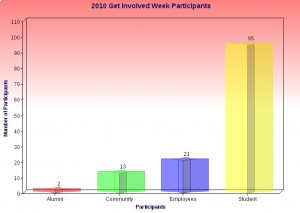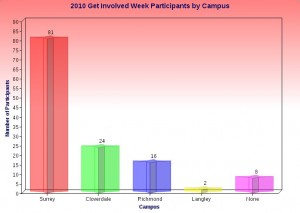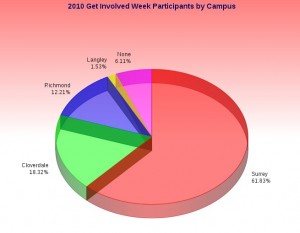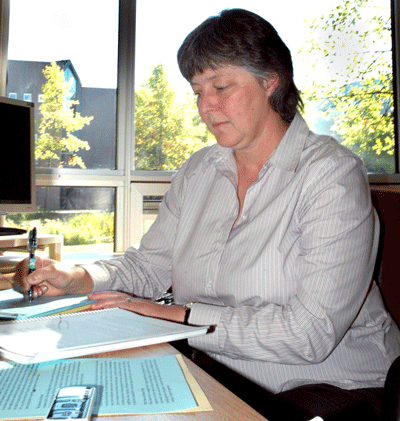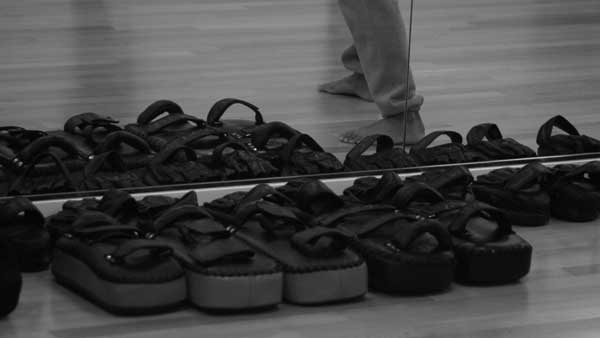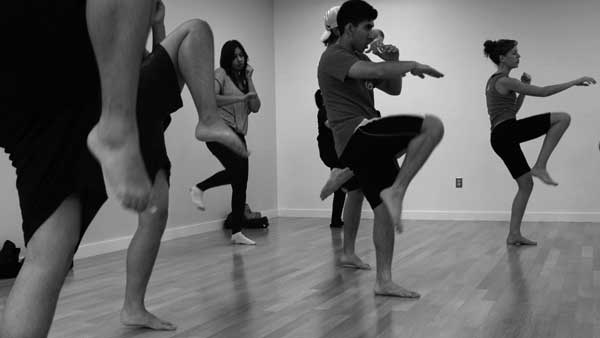Student parents program offers much needed support
October 3, 2010 by Meagan Gill · Leave a Comment
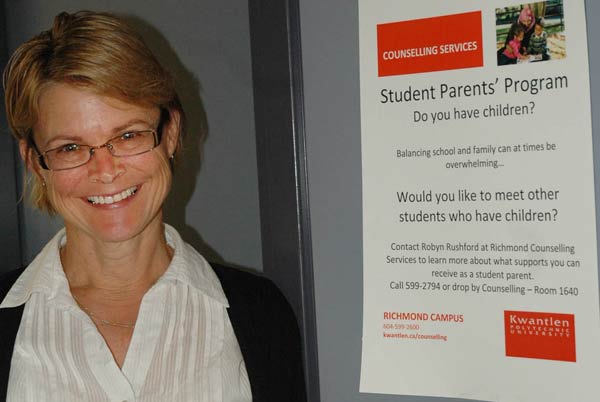
Robyn Rushford, a counsellor at Kwantlens' Richmond campus, stands next to the Student Parents' Program sign on Sept. 27. (Photo by Meagan Gill)
Making the decision to further your education is one of the most important decisions in life. For students who have children, making the decision can be tougher, because they have to try and balance school work with being a parent.
The Student Parents’ Program is a support group that allows students to connect with other students who have children.
The group has weekly sessions that include workshops on parent education, financial planning, taxation, budgeting, study skills, stress management, nutrition and women’s health. They also take part in outdoor activities, arts and crafts, yoga and aerobics classes.
Robyn Rushford, a counsellor at Kwantlen, tries to schedule the group meeting around the students’ class times, to make sure as many students as possible can attend. Currently, she offers support to 15 students, and approximately 6-8 attend the weekly group meetings.
“I hope that this program increases a sense of belonging for the students, because when you do have kids you don’t have as much freedom and flexibility to participate in the school community,” said Rushford.
A former student parent, Rushford understands the challenges students face with finances and balancing class times around daycare.
Student who are parents can receive a $75-a-month per child bursary, with a maximum of $500 per semester. This bursary is offered to the students in fall and spring semesters; the only criteria is that they have to participate in the weekly group meetings.
“It’s a way of supporting the group and supporting the students who make that commitment to the group,” said Rushford.
Through the Kwantlen Foundation, funds are raised for the group which can be used to buy bus tickets from the KSA for students who can’t afford transportation to and from school. For a few years, the students in the program have also been doing fund-raising, usually by having a school bake sale, to support a family in need for Christmas.
“My group really believe in helping those who are in need,” said Rushford.
The Student Parents’ Program has been in existence at the Richmond Campus since 2000. Later this year, the Surrey campus will offer the program as well.
“Some students, in the entire time they are at Kwantlen, will participate in the program,” said Rushford.
One of those students is Jodi Macdonald, a single mother of two, in the last semester of her psychology degree.
“As long as I’ve been at Kwantlen, I’ve been going to the support group,” said Macdonald.
One of the struggles she is facing now is that her son has been ill and she has a hard time making it to classes because her daycare centre won’t take him when he’s sick.
“I’m a single parent and it’s hard to find someone to look after my kids on weekends or in the evenings, but if I do find someone, it’s an issue that my kids are not be seeing me enough during the day. I’m their only parent and it’s not fair to them if I’m never home,” said Macdonald.
Even when she took a break from school to have her baby, Macdonald still attended the group, because she liked the support she received.
“The group gets you out of the house. Usually, when people have a baby, it can get quite isolating if you don’t go out and be with people. It’s nice to talk to other moms because they understand exactly what you’re going through,” said Macdonald.
Kwantlen students dreaming of more sleep
October 3, 2010 by Jocelyn Gollner · Leave a Comment
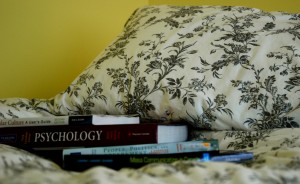
Many students are not getting the recommended 8 hours of sleep per night. (Photo by Jocelyn Gollner)
Kwantlen students may not be getting the sleep that they need.
The average amount of sleep that Kwantlen students get each night is six hours, based on an interview with 15 students. According to Dr. Najib Ayas, a member of the Sleep Disorders Program at UBC, students should be getting about eight.
Without a proper amount of sleep, Ayas says that “ your cognition won’t be as good, so you won’t be as alert. And you won’t be able to learn as well.”
If that doesn’t persuade you to get more sleep, he also says that sleep deprivation “affects your appetite hormones and that can actually lead to weight gain.” But with school, work, relationships, family commitments, sports, etc., getting more sleep can be easier said than done.
“I get like six or seven hours of sleep,” said Jennifer Chong, a student at Kwantlen. “If it were my choice I would get way more. Then I would feel way more relaxed.”
When asked what prevents her from getting more sleep, she said it’s mostly studying.
Jina Seo, a design student, also gets about six hours of sleep each night. Does she feel that that is enough?
“No, of course not,” she said.
RELATED: Stress relief for students is a no-brainer
Get Involved Week 2010: 63.8 per cent increase in participants
October 3, 2010 by Sarah Casimong · Leave a Comment
Although student life and development fell short of its goal for 300 participants for this year’s Get Involved Week, there has been a 63.8 per cent increase over last year in the number of people involved.
Kwantlen’s annual community-building charity event, which took place Sept. 20-25, had a total of 131 people involved in 32 different activities. Each participant was required to donate a minimum of $10 for Free The Children.
According to Kurt Penner, student life and development coordinator, that is an improvement from the 80 participants last year, 20 employees and 60 students.
Of this year’s 131 participants, 95 were students, 21 were employees, 13 were community members and two were alumni. That is a 58.3 per cent increase in student participation from last year. The Surrey campus had 81 participants, 61.8 per cent of all who got involved, while Langley had the fewest number of participants: two.
The final donation total came to $1,241, $491 more than what was made in 2009.
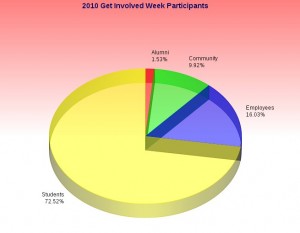
Stress relief for students is a no-brainer
October 3, 2010 by Amanda Punshon · 1 Comment
Stress — The one thing everyone has and no-one wants…It is known to cause suicide, murder, tumours, AIDS, and cancer. So don’t get stressed out, ’cause stress SUCKS! Usually caused by something unfortunate, like death, job loss, woman loss, school, etc..” (Urban Dictionary).
While there is no scientific correlation between stress and tumours, AIDS or cancer, the author of that definition did get two things right: stress sucks, and it’s something we all have to deal with.
There are many different ways to manage it. Dr. Rod Le Blanc, a doctor of traditional Chinese medicine and acupuncturist, takes a drug-free approach. “Deep breathing and stretching has been the most important way to relieve stress for 4,000 years. Five, maybe. You could even say six.”
In addition to deep breathing and stretching, Dr. Le Blanc says that acupressure or massage can help.
“If you can team up with a friend who wants a massage and you want a massage, you can start working along the back of the spine. And do this gently, because some people are more sensitive than others and some people need more pressure than others, so you always have to be aware of who you’re dealing with…You start up at the top, at the C7 vertebrae and go along the spine.”
If you don’t have a friend who can help you, there are many devices that can do the same thing — even the corner of a doorway can be used to apply pressure along the spine, Dr. Le Blanc says.
Deep breathing and a simple mantra
Like Le Blanc, Jas Maan, a pharmacist at Shoppers Drug Mart on Nordel Way in Surrey, recommends deep breathing to relieve stress. “With breathing exercises, there’s also mantras you can use…I know one really popular one by this Vietnamese Buddhist monk; he put out a few books. One of the ones he said, it was a really simple one was “When I breathe in, I’m happy. When I breathe out, I’m relaxed.” And…[it's] as if someone was reassuring you.”
Maan says that moderate to heavy physical activity — activities such as running and hockey — is a great way to calm down. And as always, exercise and diet go hand-in-hand. “A lot of people find during exam season that they’re really blah…and one of the biggest reasons is that people don’t really pay attention to their nutrition. They’re eating X-Y-Z that’s probably more harmful than good. Things like just getting in their fruits and veggies can go a long way.”
There are also a variety of over-the-counter stress-relief aids.
“There’s Vitamin B-100. It’s a complex of vitamin B. It does help many processes of the body to help reduce stress levels,” Maan says. “There’s another herb as well called valerian root, you can take it at about 100-200mg at bedtime as needed.”
If stress is causing you to lose sleep, Maan recommends taking 25 to 50mg of Benadryl, an allergy medication, which contains the same active ingredient as over-the-counter sleep aids, but is much cheaper. Melatonin, a natural sleep hormone, will also help.
‘We’re never going to be stress-free’
Dawn Schell, a counsellor at Kwantlen’s Surrey campus, knows that “we’re never going to be stress-free. We need stress to hold us together as human beings.” She helps students figure out “the point at which it’s too much, it’s over the top and you can’t cope. We don’t want people to get to the point where they’re not coping at all and everything falls through the cracks.”
Schell advises students to make use of the resources available to them. Kwantlen offers seminars in time management, study skills and avoiding procrastination, all of which Schell identifies as causes of student stress. Students can also come in for individual appointments.
“We’re more than happy to help people sit down and figure out what’s going to work for them, what’s going to work in the immediate short-term, but also to help them look ahead to what are some things that they can learn so they can be more proactive in the future as well. Sometimes people just need to come in and let off some steam; they just need to unload somewhere and they can do that here.”
Schell says the first thing anyone has to do to relieve their stress “is learning about stress — how [I] personally respond to it, what’s stressful for [me]…and how does it affect me physically, and also how does it affect me mentally and how does it affect me emotionally. Because if I am the type of person who, for example, where I carry my stresses all physically, so then the body starts to tense up…then I need to learn how to use physical relaxation techniques.
“For some people it’s the brain that’s going. So how do you stop and calm your brain down enough so then you can refocus on whatever it is you need to do? For some people, it’s a combination. Sometimes they have to start with the mind and then go through the body.”
Building a relaxation toolbox
Once you’ve figured out your stress style, Schell advises assembling a personalized toolbox of relaxation techniques. For some people, that may involve setting deadlines or timelines, self-coaching or taking breaks.
“Sometimes it’s just about the mental break when you’re in school. Just let the brain go on neutral for a short period of time,” she says. There are a variety of online resources that students can use to help with deep relaxation.
If you’re already in the midst of a stressful situation, Schell says to “take five minutes and really sit down and figure out what’s the most important thing I need to do?… Maybe I need to back out of something that I’ve agreed to already. Some of it is, ‘How do I pull back a little bit, in a reasonable way?’ And some of that is really having a serious look at, ‘What is my top priority right now, and how can I do that?’”
Schell also advocates taking breaks.”You need to plan some fun or some relaxation or some time just for yourself in the midst of [stressful situations], because nobody can go through 24 hours-a-day, seven days-a-week without a break. That’s why we have eight-hour work days, that’s why people have lunch breaks…they need to build those kinds of opportunities in as well when they’re students. To just take a break and walk away, but know that there’s a time limit.”
Something as simple as getting up and moving around while studying can change the blood flow and wake you up, she says. And “if you really need a good break, find a movie that you find to be funny, or a show or something, because laughter sure helps a lot.”
Some online stress-relief resources
RELATED: Kwantlen students dreaming of more sleep October 1, 2010 by Stu Gallacher · Leave a Comment Every Monday and Wednesday at 4 p.m., Kwantlen students are meeting at the Blossoming Lotus Studio for an hour of good, wholesome kickboxing. You don’t even need any formal or prior kickboxing experience. “I’m taking these classes to get in shape and because it sounded cool. I’ve played soccer for 12 years so I needed something different and I didn’t want another team sport,” says Rachel Moir, 18, who’s in general studies. The session begins with a 12-minute warm-up that includes the jumping jacks, stars, burpies, climbers, dive-bombers, push-ups and on-the-spot running. After that, you learn a basic fighting stance followed by a left-jab-right-hook (one-two) combination. “It makes me feel a lot safer walking around Vancouver,” says Jena Renwick, 21, who studies fashion design and technology. The instructors, Milo and Marcy Hilario, who have been kickboxing for 12 years, demonstrate and explain the techniques in terms that are easy to understand. Then you strap on the gloves and pads and partner up and the real fun begins. Simulating a three-minute round, you practice the one-two combination with 30-second intervals of continuous punching. Your endurance is truly put to the test. You alternate three rounds each with your partner, while Milo and Marcy provide tips for all the students, before lining up to learn knee strikes. You repeat that routine 20 times into the air. Then you’re back with your partner, executing an aggressive jab-hook-knee combination into the pads. The kickboxing element of the class is capped off with three minutes of non-stop right and left hooks, as well as upper-cuts, with your partner and pads. If you’re on the floor after that, it’s okay. The session ends with a three-minute abdominal workout. “The workouts involve your shoulders. You’ve got to keep your shoulders up the whole time. Then your abs start hurting. For an hour, they pack a lot in,” says Corbin Mountford, 19, who studies business administration. The gloves, pads and music are supplied by the instructors. Everyone trains in bare feet and comfortable fitness attire. Classes are cumulative, so the more you go, the more you learn. Membership is $30 a month or $6 for a drop-in class; you can register on-line or visit the KSA office for more information. “It’s a great sport to learn and gives you lots of confidence,” says Renwick.
Kickboxing: staying in shape, feeling safe

